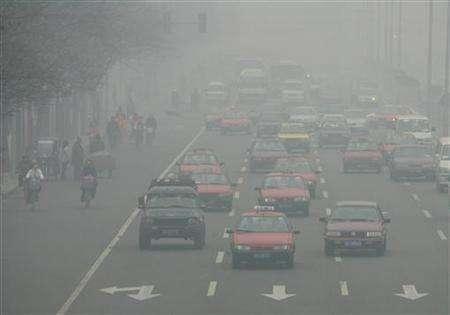While America has drastically reduced its greenhouse gas emissions - CO2 from energy is back at early 1990s levels and emissions from coal are back at early 1980s levels - that isn't good enough for many environmentalists. Meanwhile, China is setting the stage to offset all of the greenhouse emissions cuts by the rest of the world while claiming they lead in clean energy.
But protests are a luxury of democracies. The environmentalists who cheered when the Chinese dictatorship banned cars during the Beijing Olympics won't find much to be happy about when the same regime brings on its synthetic natural gas plants. Protests would only get tanks driving at people.
Synthetic natural gas? Right, it makes as little sense as synthetic organic food. Coal-derived natural gas has been shown to be a negative in terms of life-cycle energy efficiency and CO2 emissions recently(1) using GREET, The Greenhouse Gases, Regulated Emissions, and Energy Use in Transportation life-cycle model developed by Argonne National Laboratory, and a new paper in Nature Climate Change(2) adds to that, noting that the plants would produce 7X the carbon dioxide emissions of conventional natural gas and use 100X the water as shale gas production.

How not to fix Beijing's pollution problem. Replace gasoline cars with anything powered by synthetic natural gas. REUTERS/Reinhard Krause/Files
The water demands, emissions and other environmental impacts are being mostly ignored but China is building them so they can state they are giants in cleaner energy, much like they do with their solar plants. So far, they have signed off on 9 synthetic natural gas (SNG) plants that the Nature Climate Change authors say will produce more than 37 billion cubic meters of synthetic natural gas annually. They estimate that private companies are planning an additional 30 SNG plants, and that will mean up to 200 million cubic meters of natural gas per year.
That's all fine, if the natural gas were actually protecting the environment and therefore people, the way it has dramatically reduced greenhouse gas emissions in the US. But it doesn't work out that way. The recent GREET analysis in Energy Policy found that:
* A compressed natural gas (CNG) car using SNG instead would have life-cycle CO2 emissions 150–190% higher than a gasoline car
* A compressed natural gas car using SNG instead would have life-cycle CO2 emissions 140–210% higher than an electric car powered by electricity from coal-fired power plants.
* A city bus using SNG will have life-cycle emissions 220–270% higher than that of a diesel bus.
"These plants are coming online at a rapid pace. If all nine plants planned by the Chinese government were built, they would emit 21 billion tons of carbon dioxide over a typical 40-year lifetime, seven times the greenhouse gas that would be emitted by traditional natural gas plants," said Robert B. Jackson, Nicholas Professor of Environmental Sciences and director of the Duke Center on Global Change, in a statement about new recent Nature Climate Change paper. "If all 40 of the facilities are built, their carbon dioxide emissions would be an astonishing 110 billion tons."
The new paper added to the concern about China's synthetic natural gas rollout. The new analysis determined that:
* Total life-cycle greenhouse gas emissions would generally be 36-82% higher than pulverized coal-fired power.
* If the synthetic natural gas is used to fuel vehicles, the life-cycle greenhouse gas emissions will be 2X what they would be if people stayed with gasoline vehicles.
"The increased carbon dioxide emissions from the nine government-approved plants alone will more than cancel out all of the reductions in greenhouse gas emissions from China's recent investments in wind and solar electricity," said Chi-Jen Yang, also of the Center on Global Change at Duke University lead author of the Nature Climate Change paper. "While we applaud China's rapid development in clean energy, we must be cautious about this simultaneous high-carbon leapfrogging."
References:
(1) Ding, Yanjun & Han, Weijian&Chai, Qinhu & Yang, Shuhong & Shen, Wei, 'Coal-based synthetic natural gas (SNG): A solution to China’s energy security and CO2 reduction', Energy Policy, vol. 55(C), pages 445-453 DOI: 10.1016/j.enpol.2012.12.030
(2) Chi-Jen Yang, Robert B. Jackson, 'China's synthetic natural gas revolution', Nature Climate Change 3, 852–854 doi:10.1038/nclimate1988





Comments